What is DAC?

Direct Attach Cable, referred to as DAC. With hot-swappable transceiver modules like SFP+, QSFP, and QSFP28. It provides a lower-cost, high-density interconnects solution alternative for high-speed interconnects from 10G to 100G to fiber optics transceivers. Compared with optics transceivers, the direct attach cables provide a cost-effective solution that supports multiple protocols including 40GbE,100GbE, Gigabit & 10G Ethernet, 8G FC, FCoE, and Infiniband.
In today’s Data Centers, more bandwidth is needed to support the use of server virtualization where multiple virtual machines are combined on a single physical host server. To accommodate the ever-growing number of operating systems and applications residing on individual servers, virtualization requires significantly increased data transmission between the servers and switches. At the same time, the amount and type of devices residing on the network have dramatically increased the amount of data that needs to be transmitted to and from storage area networks (SANs) and Network Attached Storage (NAS). The application is mainly for high-speed I/O applications in storage, networking, and telecom markets, Switches, servers, routers, network interface cards (NICs), Host Bus Adapters (HBAs), and High Density and High Data Throughput.
Types of Direct Attach Copper Cable

What is AOC?

Active Optical Cable is referred to as AOC. AOC is two transceivers attached together by a fiber cable, creating a one-part assembly. Like DAC, Active Optical Cable cannot be separated. However, AOC does not use copper cables but fiber cables allowing them to reach longer distances.
Active Optical Cables can reach distances from 3 meters up to 100 meters, but they are commonly used for a distance of up to 30 meters. The AOC technology has been developed for several data rates, such as 10G SFP+, 25G SFP28, 40G QSFP+, and 100G QSFP28.
AOC also exists as breakout cables, where one side of the assembly is divided into four cables, each terminated by a transceiver of a smaller data rate, allowing to connection a larger number of ports and devices.
Types of Active Optical Cable

How Active Optical Cables are used?
Active Optical Cables are mostly used to connect switches, servers, and storage between different racks inside a data center for example. AOC is also used to link devices inside the same rack.
Why use Active Optical Cable (AOC Cable)?
Active optical cable (AOC) assemblies were invented to replace copper technology in data centers and high-performance computing (HPC) applications in virtue of their stability and flexibility.
Active Optical Cable can reach a longer distance than DAC, up to 100 meters depending on the data rate and the type of fiber cable used. They are lighter and smaller than the DAC, but they are more expensive, which is one of their main drawbacks. Unlike DAC, AOC is immune to EMI (electromagnetic interference).
Active Optical Cables are comparable to using transceivers and separate cables in terms of performance. One of the advantages of AOC compared to using optical transceivers is that there is less maintenance work. Indeed, there is no need of assembling and cleaning the connectors. AOC is a cheaper interconnect solution and also decreases operating costs by consuming less power.
Optical engine technology of AOC
High-speed optical interconnect products 40Gbps QSFP+ AOC and 120Gbps CXP AOC no longer adopt the TOSA/ROSA architecture design of traditional pluggable transceivers but uses a highly integrated array light engine core device technology. AOC’s technical barriers are high, not only for packaging and manufacturing equipment but also for upstream optical engine technology.
The optical engine consists of a laser array, a detector array, a fiber array, and associated drive electronics. Array optical engine technology has been widely used in active optical cable products – the interconnection between servers and switches. At the same time, optical engine technology is also facing great challenges.

Related Products:
-
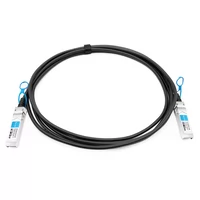 Mellanox MCP2M00-A003 Compatible 3m (10ft) 25G SFP28 to SFP28 Passive Direct Attach Copper Cable
$30.00
Mellanox MCP2M00-A003 Compatible 3m (10ft) 25G SFP28 to SFP28 Passive Direct Attach Copper Cable
$30.00
-
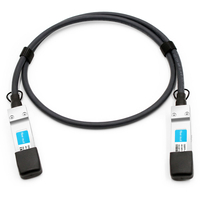 QSFP-40G-PC3M 3m (10ft) 40G QSFP+ to QSFP+ Passive Copper Direct Attach Cable
$23.00
QSFP-40G-PC3M 3m (10ft) 40G QSFP+ to QSFP+ Passive Copper Direct Attach Cable
$23.00
-
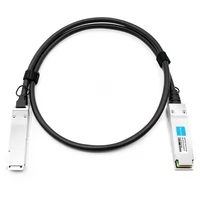 QSFP28-100G-PC3M 3m (10ft) 100G QSFP28 to QSFP28 Copper Direct Attach Cable
$43.00
QSFP28-100G-PC3M 3m (10ft) 100G QSFP28 to QSFP28 Copper Direct Attach Cable
$43.00
-
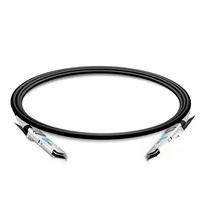 Mellanox MCP1650-H003E26 Compatible 3m (10ft) Infiniband HDR 200G QSFP56 to QSFP56 PAM4 Passive Direct Attach Copper Twinax Cable
$80.00
Mellanox MCP1650-H003E26 Compatible 3m (10ft) Infiniband HDR 200G QSFP56 to QSFP56 PAM4 Passive Direct Attach Copper Twinax Cable
$80.00
-
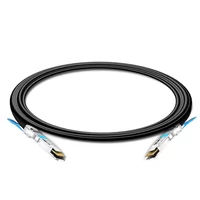 Mellanox MCP1660-W003E26 Compatible 3m (10ft) 400G QSFP-DD to QSFP-DD PAM4 Passive Direct Attach Copper Twinax Cable
$160.00
Mellanox MCP1660-W003E26 Compatible 3m (10ft) 400G QSFP-DD to QSFP-DD PAM4 Passive Direct Attach Copper Twinax Cable
$160.00
-
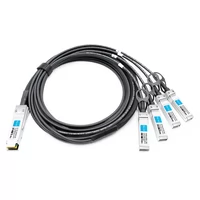 QSFP28-4SFP28-PC5M 5m (16ft) 100G QSFP28 to Four 25G SFP28 Copper Direct Attach Breakout Cable
$120.00
QSFP28-4SFP28-PC5M 5m (16ft) 100G QSFP28 to Four 25G SFP28 Copper Direct Attach Breakout Cable
$120.00
-
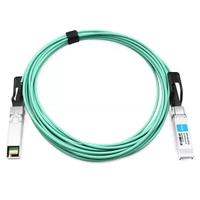 SFP28-25G-AOC5M 5m (16ft) 25G SFP28 to SFP28 Active Optical Cable
$45.00
SFP28-25G-AOC5M 5m (16ft) 25G SFP28 to SFP28 Active Optical Cable
$45.00
-
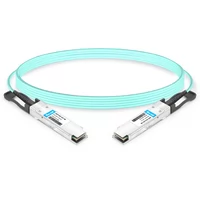 QSFP-40G-AOC-5M 5m (16ft) 40G QSFP+ to QSFP+ Active Optical Cable
$75.00
QSFP-40G-AOC-5M 5m (16ft) 40G QSFP+ to QSFP+ Active Optical Cable
$75.00
-
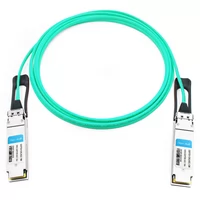 QSFP28-100G-AOC-10M 10m (33ft) 100G QSFP28 to QSFP28 Active Optical Cable
$105.00
QSFP28-100G-AOC-10M 10m (33ft) 100G QSFP28 to QSFP28 Active Optical Cable
$105.00
-
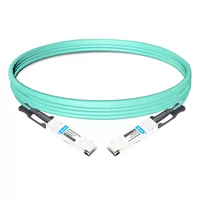 Mellanox MFS1S00-H010E Compatible 10m (33ft) 200G HDR QSFP56 to QSFP56 Active Optical Cable
$465.00
Mellanox MFS1S00-H010E Compatible 10m (33ft) 200G HDR QSFP56 to QSFP56 Active Optical Cable
$465.00
